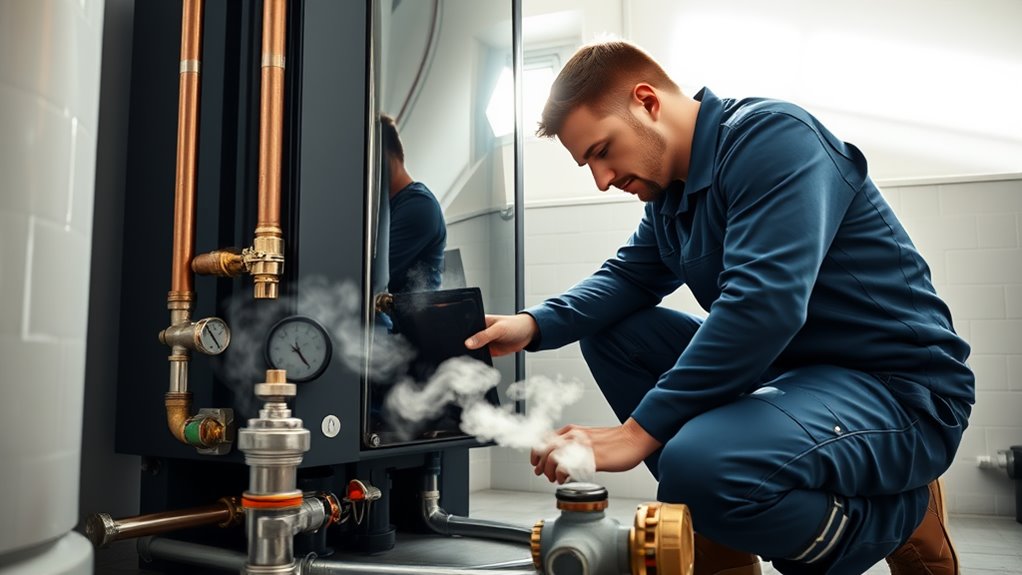Installing a new boiler usually takes one to three days. This duration depends on factors like the type of boiler you've chosen, the complexity of the installation, and the existing plumbing's condition. For instance, combi boilers tend to be quicker to install than system boilers. The plumber's experience also plays a crucial role. If you want to understand more about the specifics that can affect this timeline, keep exploring.
Key insights
- Installation time typically ranges from one to three days, depending on various factors.
- Combi boilers are quicker to install than system boilers due to their setup requirements.
- The plumber's experience significantly influences the efficiency and duration of the installation.
- Existing plumbing conditions must be assessed prior to installation to avoid delays.
- Local building regulations and necessary permits can impact the overall installation timeline.
Factors Influencing Installation Time
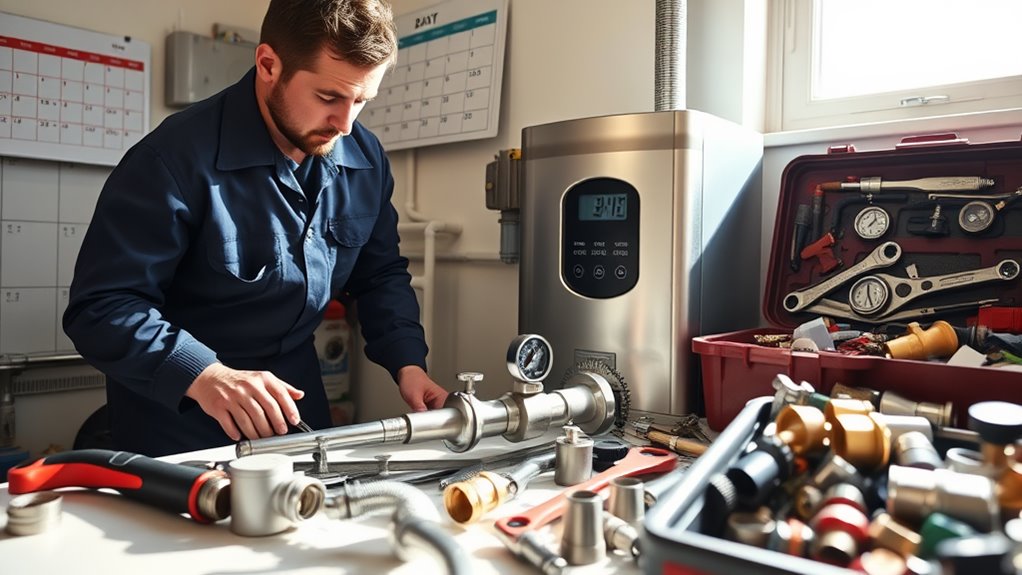
When considering how long it takes to install a new boiler, several key factors come into play that can greatly affect the timeline. First, installation complexity can notably influence the duration. If your home requires extensive modifications to accommodate the new system, you might face longer installation times. Additionally, the type of boiler and its specific requirements can add to this complexity. Technician availability is another vital factor; if skilled technicians are in high demand or booked up, you could experience delays. It's important to schedule your installation during off-peak times or to secure an appointment well in advance. By understanding these factors, you can better manage your expectations and timelines for your boiler installation. Moreover, compliance with local building regulations is crucial and may impact the overall timeline for installation.
Types of Boilers and Their Impact on Installation
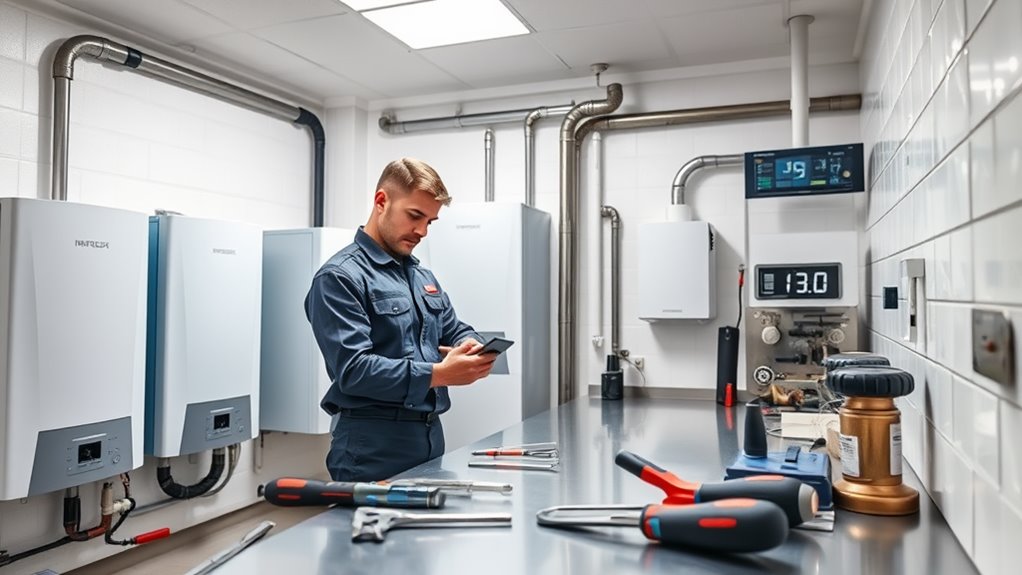
Although various types of boilers are available, each comes with its own installation requirements and complexities that can greatly impact the overall timeline. Combi boilers are generally quicker to install since they combine heating and hot water in one unit, eliminating the need for additional tanks. Their compact design can simplify the process, especially in smaller spaces. In contrast, system boilers require more extensive setup due to the need for separate hot water storage and additional piping. This added complexity can lengthen installation time, as your plumber will need to guarantee proper integration with your existing system. Ultimately, understanding the type of boiler you choose will help you gauge how long the installation will likely take. Regular commercial boiler service can also play a significant role in ensuring a smoother installation process as it helps identify any existing issues that could complicate the setup.
Assessing Existing Plumbing Infrastructure
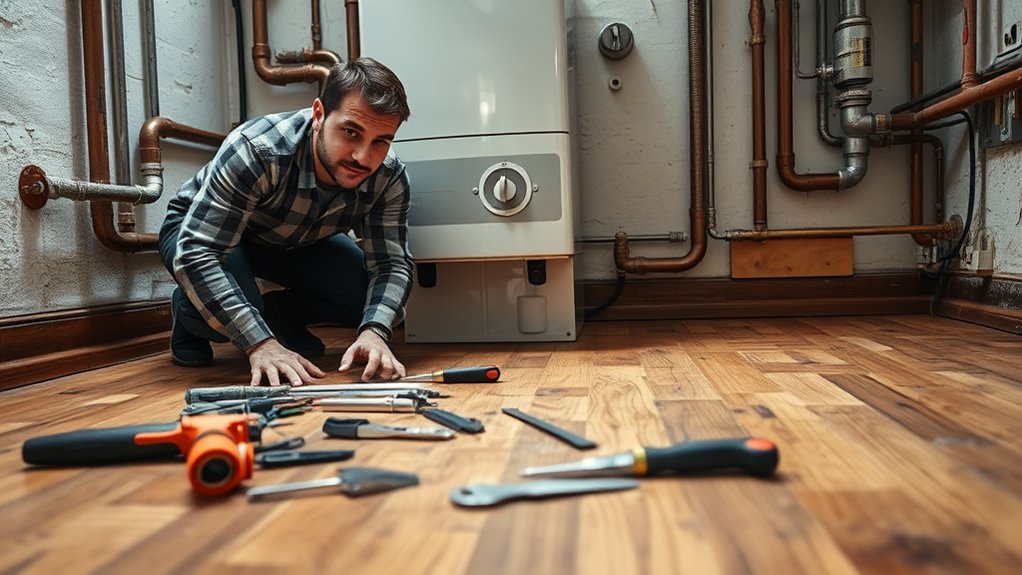
Before installing your new boiler, you need to assess the compatibility of your existing plumbing system. Check the condition of your pipes to verify they can handle the new unit's requirements without issues. This evaluation will help prevent costly repairs and guarantee efficient operation. Additionally, ensuring your system meets current safety and environmental standards is crucial for reliable performance and compliance.
Plumbing System Compatibility
Evaluating the compatibility of your existing plumbing infrastructure is crucial before installing a new boiler, as it directly impacts efficiency and performance. Begin by conducting a thorough system evaluation to verify your plumbing meets current plumbing standards. Check the size and type of pipes used; they should align with your new boiler's requirements for ideal water flow and pressure. Additionally, verify that the existing connections and fittings can accommodate the new unit without modifications. Understanding whether your system is designed for a conventional or combi boiler can also influence compatibility. Addressing these factors beforehand will minimize installation time and guarantee your new boiler functions effectively, providing reliable heating and hot water for your home. Regular maintenance of the HVAC systems is also essential to ensure long-term efficiency and performance of your new boiler.
Pipe Condition Assessment
Since the condition of your pipes plays a vital role in the overall efficiency of your new boiler, it's important to assess their state before installation. A thorough pipe condition assessment guarantees peak performance and longevity. Here's what to focus on:
- Pipe Integrity: Check for structural soundness and any signs of leaks.
- Corrosion Assessment: Look for rust or deterioration that could affect flow.
- Joint Condition: Inspect fittings and joints for wear or gaps.
- Debris Buildup: Evaluate for blockages that might hinder water flow.
- Material Compatibility: Confirm existing materials are suitable for the new system.
Additionally, ensuring that there are no leaks in pipes will help prevent potential E119 errors after the new boiler installation.
The Role of the Plumber's Experience
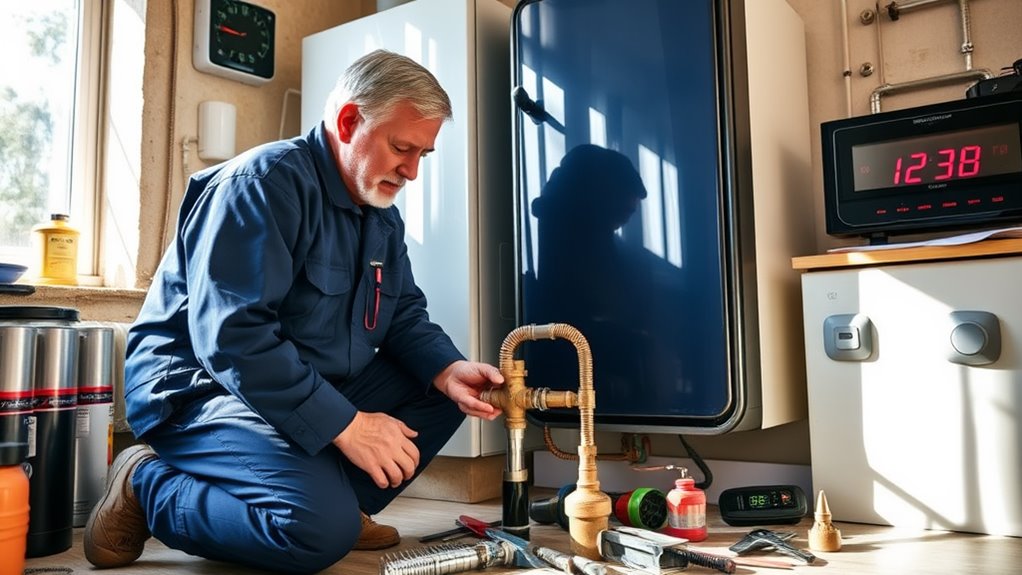
While the cost of a new boiler and the type you choose are important factors, the plumber's experience can greatly impact the installation process. A qualified plumber brings essential knowledge of various installation techniques, which can streamline the project. Experienced plumbers are adept at troubleshooting potential issues that may arise during installation, guaranteeing compliance with local codes and safety standards. Their familiarity with different boiler types allows them to make informed recommendations and adjustments. Additionally, seasoned plumbers can efficiently manage time, reducing the overall installation duration. When selecting a plumber, consider their qualifications and track record to guarantee a smooth and effective boiler installation, ultimately saving you time and potential future headaches. Moreover, ensuring that the plumber is Gas Safe registered is crucial for compliance and safety in gas appliance installations.
Preparation Steps Before Installation
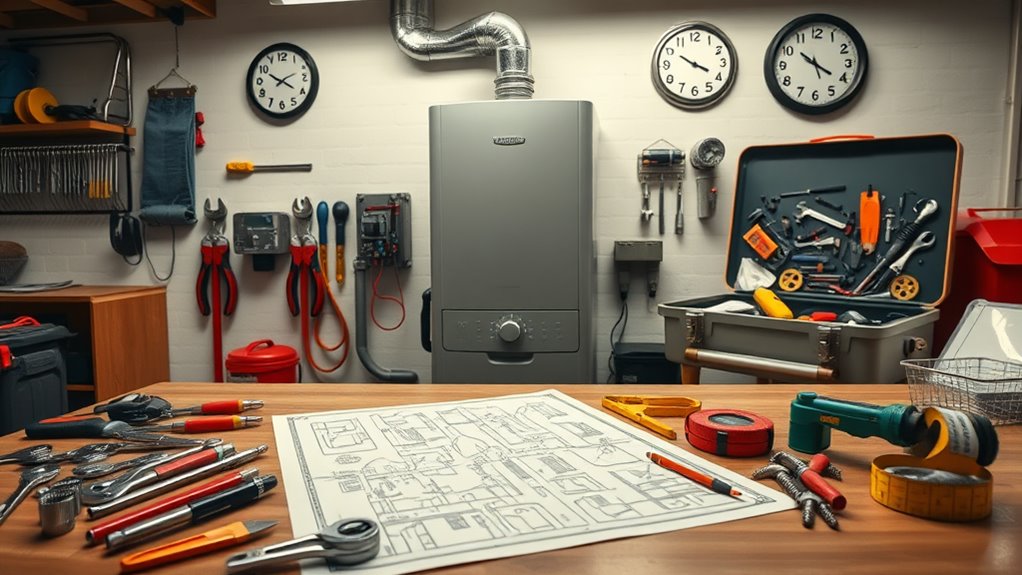
Before you start the boiler installation, you need to assess your specific boiler requirements, ensuring it meets your home's heating needs. Gather all necessary tools, including wrenches, screwdrivers, and safety gear, to streamline the process. Additionally, make sure to comply with local safety regulations to avoid hazards during the installation. Regular boiler maintenance is crucial to ensure peak efficiency and prevent future issues.
Assessing Boiler Requirements
Properly evaluating boiler requirements is essential for a successful installation, as it guarantees the system meets your home's heating needs efficiently. Start by reviewing your current boiler's performance to determine boiler efficiency and energy requirements.
Consider the following factors:
- Home Size: Calculate the square footage to determine heating capacity.
- Insulation Quality: Evaluate how well your home retains heat.
- Hot Water Demand: Assess your household's hot water usage patterns.
- Fuel Type: Identify the energy source—gas, oil, or electric.
- Local Climate: Factor in temperature extremes that impact heating needs. Regular maintenance helps prevent common error codes that can disrupt your heating system's performance.
Gathering Necessary Tools
Once you've assessed your boiler requirements, gathering the necessary tools is your next step in preparing for installation. Proper tool selection is essential to guarantee a smooth and efficient process. You'll need a range of equipment, including wrenches, screwdrivers, pipe cutters, and a multimeter to check electrical connections. Don't forget safety gear like gloves and goggles. If your installation involves new piping, gather appropriate fittings and sealants. Organize your workspace to avoid delays and keep everything within reach. Before starting, double-check that you have all required tools, as missing equipment can lead to unnecessary interruptions. Efficient equipment gathering and preparation will streamline the installation process and help you complete the task effectively. Additionally, ensure you have a multimeter for diagnostics in case you need to troubleshoot any electrical issues during or after installation.
Ensuring Safety Regulations
Guaranteeing safety regulations is essential to a successful boiler installation, and there are several key steps you must take to comply with local codes and standards. Prioritize the following actions to meet safety standards and guarantee code compliance:
- Verify the installation site meets all clearance requirements.
- Check that existing piping and electrical systems are in good condition.
- Confirm the boiler's specifications match local safety codes.
- Obtain necessary permits before commencing installation.
- Schedule a professional inspection to validate your work post-installation. Additionally, consider scheduling a professional power flushing to ensure the heating system operates efficiently and safely after the installation.
Typical Installation Timeline Breakdown
While the specific timeline for installing a new boiler can vary based on factors like the type of boiler and the complexity of the installation, you can generally expect the process to take one to three days. Initially, the plumber assesses your existing system, identifying any installation challenges that may arise. This assessment guarantees the new boiler will operate at peak boiler efficiency.
The first day typically involves removing the old unit and preparing the installation site. On the second day, the plumber installs the new boiler, connecting it to existing pipes and wiring. If complications arise, such as needing additional parts or modifications, it may extend the timeline. However, with proper planning, you can minimize delays and guarantee a smooth installation process.
Post-Installation Considerations
After the installation of your new boiler, it's crucial to understand the necessary steps to guarantee peak performance and longevity. Implementing post-installation maintenance not only enhances energy efficiency but also extends the lifespan of your unit. Here are key considerations to keep in mind:
- Schedule regular maintenance checks with a qualified technician.
- Monitor the system for unusual noises or pressure fluctuations.
- Regularly inspect and replace air filters to promote optimal airflow.
- Keep the area around the boiler clear of debris and obstructions.
- Document all service and maintenance activities for future reference.
Tips for a Smooth Installation Process
To achieve a smooth boiler installation, you need to prepare adequately and coordinate effectively with your installation team. Start with an installation checklist to guarantee every aspect is covered, including permits, equipment, and safety protocols. Confirm your chosen boiler's compatibility with existing systems and plan for any necessary adjustments.
Communicate clearly with your plumber about your expectations and timelines. Before installation, review boiler maintenance tips, such as proper venting and water quality considerations, to prevent future issues. Verify access to the installation site is clear and that all required materials are on hand. Finally, schedule a follow-up appointment to discuss maintenance and warranty details, ensuring your new boiler operates efficiently for years to come.
Frequently Asked Questions
What Permits Are Needed for Boiler Installation?
When you're planning a boiler installation, it's vital to understand the necessary permits. Local plumbing permits are often required to comply with boiler installation regulations. These permits guarantee your installation meets safety and efficiency standards. You'll typically need to submit plans and possibly schedule inspections. Always check with your local building authority to determine specific requirements, as they can vary by location. Proper permits help avoid fines and guarantee a safe installation.
Can I Install a Boiler Myself?
You can install a boiler yourself, but it's essential to understand the complexities involved in boiler installation. Make certain you follow local codes and safety regulations. Research DIY tips thoroughly, focusing on proper venting, piping, and electrical connections. Additionally, you'll need to guarantee you have the right tools and materials. If you're not confident in your skills, hiring a professional might save you time and secure a safe installation.
How Often Should I Service My New Boiler?
You should service your new boiler at least once a year to guarantee peak performance and safety. Regular maintenance helps identify potential issues early, extending your boiler's lifespan. Follow boiler maintenance tips, such as checking pressure levels and bleeding radiators. If you notice any irregularities, consider a service frequency of every six months. This proactive approach minimizes breakdowns and keeps your system running efficiently, saving you money in the long run.
What Are Common Issues After Boiler Installation?
After installing a new boiler, you might encounter common issues like boiler leaks and pressure problems. Leaks can stem from loose connections or faulty seals, while pressure issues often arise from incorrect system setup or air trapped in the pipes. It's essential to monitor your boiler's pressure gauge regularly and inspect for any signs of leaks. Addressing these problems promptly guarantees efficient operation and extends your boiler's lifespan.
Are There Warranties Available for New Boilers?
Yes, there are warranties available for new boilers, which often vary by manufacturer and boiler types. Typically, you'll find warranties covering parts for 1 to 10 years, depending on the model and installation costs. It's essential to read the warranty details, as some require annual servicing to maintain coverage. Always make certain your installation is performed by a certified professional to avoid voiding the warranty and to assure peak performance of your boiler.
Summary
To summarize, the time it takes to install a new boiler varies greatly based on several factors, including the type of boiler, existing plumbing conditions, and the plumber's expertise. By understanding these elements and preparing adequately, you can streamline the installation process. Ultimately, a well-planned approach not only guarantees efficiency but also enhances the reliability of your new system. So, stay informed and work closely with your plumber to achieve the best results.

